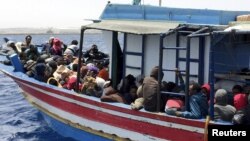Libyan military commanders loyal to the Tripoli-based government are warning that the planned European military mission to stop migrant-smuggling boats from crossing the Mediterranean will fail. They say if the plan goes ahead, it will worsen Libya's divisions.
It was the fifth annual gathering of senior Libyan military officers at Tripoli’s navy base. But with this North African country divided between two rival governments and two competing armed forces their numbers were not complete — there are comrades on the other side loyal to the internationally-recognized government in Tobruk.
Out in the harbor on this hot summer’s day, half-a-dozen patrol boats used by the Libyan coast guard to try to intercept migrant-smuggling ships roared up and down the shoreline.
Overhead four small jets used for training pilots executed a few close-formation flyovers. Gold epaulettes, red and blue berets, white dress suits and camouflage fatigues were on display.
But the Tripoli-run armed forces are woefully underequipped and not able to stem the flow at its sources -- the tens of thousands of refugees crossing into Libya from sub-Saharan neighbors either directly or via Algeria, Egypt and Tunisia.
Khaled Algadi is in charge of border guard training and he argues Libyans suffer far more from illegal immigrants and smugglers than the Europeans. Some of the people crossing into Libya include criminals who are trafficking drugs and weapons, he says.
He says Libyan forces controlled by either government do not have the equipment needed to police the borders, arguing that his units require armored desert-terrain vehicles and aerial surveillance equipment, including drones. His men would need training in such technology, if supplied, as well as how to handle immigrants in line with international standards.
This is what he wants from the Europeans.
That isn’t going to happen. Europeans — as well as Washington — have sided with the Tobruk government in the current dangerous standoff between Libya’s two governments but will supply neither side with military equipment while the rivals are fighting for control of the country.
The EU has asked the U.N. Security Council to endorse a military mission to combat people-smugglers. Neither Libyan governments are prepared to give consent. This may mean the EU will only increase interceptions in international waters and postpone plans to enter Libyan sovereign waters or destroy traffickers' boats on land.
But with numbers dramatically increasing of migrants crossing the Mediterranean in a crisis that has seen 2,000 of them drown, they might not delay for long.
In 2014 an estimated 170,000 people crossed the Mediterranean from Libya. European officials fear the number this year could climb much higher.
Colonel Ashour Marghani, a top Libyan armed forces officer, says the Europeans are making a big mistake with their go-it-alone approach. The only way to confront the problem is to develop a strategy with Libyans, he says. If the European military tries to go ahead on its own, it will merely make the problem worse.
A foreign ministry spokesman in Tripoli told VOA that if the Europeans land soldiers or enter Libyan waters to combat the smugglers, there would be a response from the Libyans.




